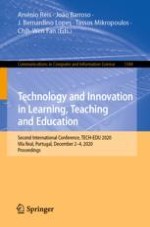2021 | OriginalPaper | Buchkapitel
Using Mathematical Modelling and Virtual Manipulatives to Teach Elementary Mathematics
verfasst von : Ricardo Silva, Cecília Costa, Fernando Martins
Erschienen in: Technology and Innovation in Learning, Teaching and Education
Aktivieren Sie unsere intelligente Suche, um passende Fachinhalte oder Patente zu finden.
Wählen Sie Textabschnitte aus um mit Künstlicher Intelligenz passenden Patente zu finden. powered by
Markieren Sie Textabschnitte, um KI-gestützt weitere passende Inhalte zu finden. powered by
